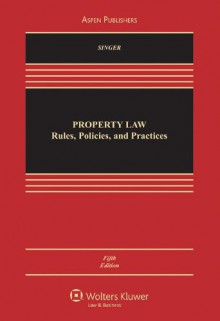Property Law: Rules Policies and Practices
Outstanding features of Property Law: Rules, Policies, and Practices, written by Professor Joseph William Singer, a highly regarded authority in the field, include:well-written notes with clear explanations of the law so students can learn complicated rules easilystrong coverage of civil rights...
show more
Outstanding features of Property Law: Rules, Policies, and Practices, written by Professor Joseph William Singer, a highly regarded authority in the field, include:well-written notes with clear explanations of the law so students can learn complicated rules easilystrong coverage of civil rights law (fair housing and public accommodations law) strong coverage of statutes, regulations, and statutory interpretation problem-oriented approach, applying concepts, rules, and doctrines to new situations one might find in practice, with problems updated to be currentrecent cases and interesting fact situationsMeticulously and thoughtfully updated and refined, the Fifth Edition offers:reorganized chapter sequence Part I, renamed "Property in a Free and Democratic Society" links the estates system to the anti-feudal policy and to the current consumer protection orientation of the subprime crisis reverses the order of previous Chapter 1 and Chapter 2 to begin with the easy-to-understand trespass material on the right to exclude and limits on the right to exclude created by common law, statutes, and constitutional law. These chapters teach from the very beginning that property rights are limited rather than absolute, that they involve social relationships, not just control over things, and that property law is defined by both common law and statutesall-new Chapter 2, "The Framework of Property Relations in a Democracy," shows the connection between property law rules designed to prevent the re-emergence of feudalism and regulations designed to respond to the current subprime mortgage crisis. New material on subprime mortgages demonstrates how we can understand all of property law by thinking about the lessons of the subprime crisis Chapter 3, now entitled "Competing Claims to Property" focuses partly on how property rights in land were historically created and partly on how property claims emerge today. Most important, it treats these issues as involving competing claims to propertynew Part II, entitled "What Can Be Owned?," puts the intellectual property chapter and the chapter on property in persons (renamed) at the beginning of the book as an introduction to the problem of defining what can be owned material on tribal property is now integrated into a coherent treatment that addresses both the legacy of conquest and contemporary legal issuesnew cases, among them:Commonwealth v. Fremont Investment & Loan (on subprime lending)Warner Bros. Entertainment, Inc. & J.K. Rowling v. RDR Books (on the Harry Potter copyright case)Wilcox v. Stroub (on ownership of the papers of Confederate governors of South Carolina)timely updates throughout, among them:information on Measure 37 in Oregon (and Measure 49) changes in mortgages law following the subprime crisischanges in adverse possession law in Colorado and New Yorkfuller coverage of the Uniform Residential Landlord and Tenant Actchanges in the law of same sex marriage state legislative and constitutional responses to Kelo and substantial changes in the rule against perpetuities LOOKING FOR ADDITIONAL RESOURCES TO HELP YOU IN PROPERTY LAW? TRY EXAMPLES & EXPLANATIONS: PROPERTY 3E (9780735570313) AND THE WOLTERS KLUWER BOUVIER LAW DICTIONARY: 2011 STUDENT EDITION (9780735568525) --TWO OF MANY GREAT STUDY GUIDES FROM WOLTERS KLUWER LAW & BUSINESS.
show less
Format: hardcover
ISBN:
9780735588608 (0735588600)
Publish date: January 20th 2010
Publisher: Aspen Publishers
Pages no: 344
Edition language: English

Property is crazy. I have such mixed feelings about the entire topic. On the one hand, this was absolutely (and to my great surprise) my favorite class that I took all year. On the other hand, I don’t think I really believe in property ownership the way we define it in the West. It seems like th...

